Model Test 2参考答案
Model Test 2听力文本和参考答案

Q: What do we know from the conversation?
Conversation One
W: Can you give me an example?
M: Certainly. One that immediately springs to mind was a Victorian surgeon by the name of Buckland. Being a great animal lover he used to share his house openly with the strangest creatures, including snakes, bears, rats, monkeys and eagles.
M: As far as preparation is concerned, there will never be an end to it.
Q: What does the man imply?
15.
W: Could you spare me a few minutes to go over a letter I have just written? You see I've never written a letter in English before, so I've probably made lots of mistakes.
Conversation Two
W: Now I've got your background. Let's talk about the management trainee scheme. What exactly do you think a manager does?
Model Test Two答案解析
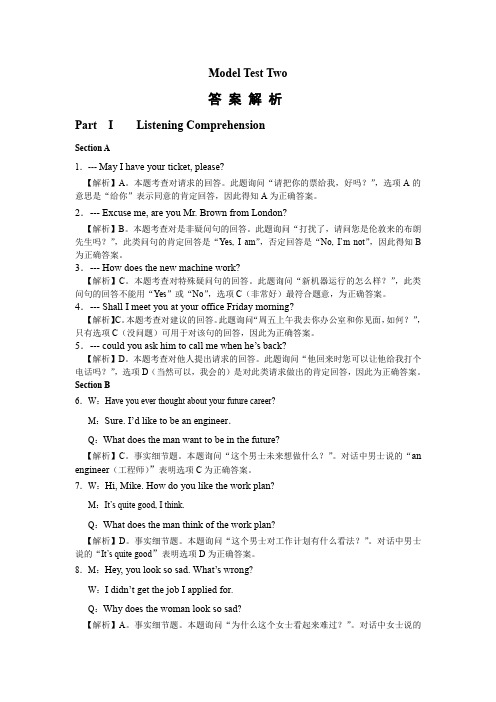
Model Test Two答案解析Part I Listening ComprehensionSection A1.--- May I have your ticket, please?【解析】A。
本题考查对请求的回答。
此题询问“请把你的票给我,好吗?”,选项A的意思是“给你”表示同意的肯定回答,因此得知A为正确答案。
2.--- Excuse me, are you Mr. Brown from London?【解析】B。
本题考查对是非疑问句的回答。
此题询问“打扰了,请问您是伦敦来的布朗先生吗?”,此类问句的肯定回答是“Yes, I am”,否定回答是“No, I`m not”,因此得知B 为正确答案。
3.--- How does the new machine work?【解析】C。
本题考查对特殊疑问句的回答。
此题询问“新机器运行的怎么样?”,此类问句的回答不能用“Yes”或“No”,选项C(非常好)最符合题意,为正确答案。
4.--- Shall I meet you at your office Friday morning?【解析】C。
本题考查对建议的回答。
此题询问“周五上午我去你办公室和你见面,如何?”,只有选项C(没问题)可用于对该句的回答,因此为正确答案。
5.--- could you ask him to call me when he’s back?【解析】D。
本题考查对他人提出请求的回答。
此题询问“他回来时您可以让他给我打个电话吗?”,选项D(当然可以,我会的)是对此类请求做出的肯定回答,因此为正确答案。
Section B6.W:Have you ever thought about your future career?M:Sure. I’d like to be an engineer.Q:What does the man want to be in the future?【解析】C。
ModelTest2答案及听力原文
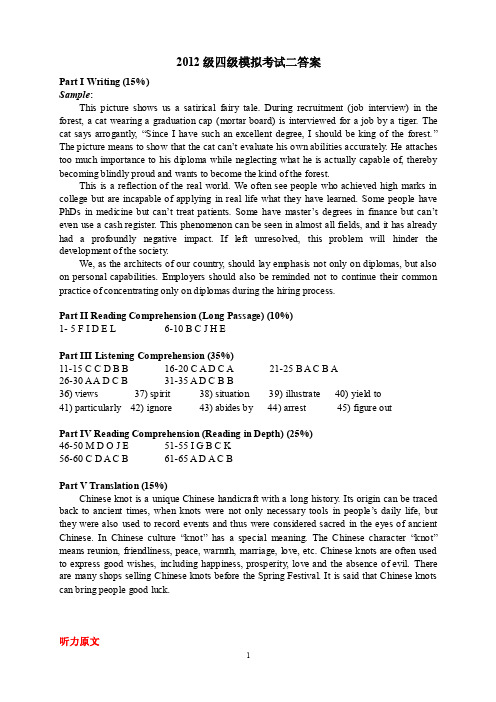
2012级四级模拟考试二答案Part I Writing (15%)Sample:This picture shows us a satirical fairy tale. During recruitment (job interview) in the forest, a cat wearing a graduation cap (mortar board) is interviewed for a job by a tiger. The cat says arrogantly, “Since I have such an excellent degree, I should be king of the forest.”The picture means to show that the cat can‟t evaluate his own abilities accurately. He attaches too much importance to his diploma while neglecting what he is actually capable of, thereby becoming blindly proud and wants to become the kind of the forest.This is a reflection of the real world. We often see people who achieved high marks in college but are incapable of applying in real life what they have learned. Some people have PhDs in medicine but can‟t treat patients. Some have master‟s degrees in finance but can‟t even use a cash register. This phenomenon can be seen in almost all fields, and it has already had a profoundly negative impact. If left unresolved, this problem will hinder the development of the society.We, as the architects of our country, should lay emphasis not only on diplomas, but also on personal capabilities. Employers should also be reminded not to continue their common practice of concentrating only on diplomas during the hiring process.Part II Reading Comprehension (Long Passage) (10%)1- 5 F I D E L 6-10 B C J H EPart III Listening Comprehension (35%)11-15 C C D B B 16-20 C A D C A 21-25 B A C B A26-30 A A D C B 31-35 A D C B B36) views 37) spirit 38) situation 39) illustrate 40) yield to41) particularly 42) ignore 43) abides by 44) arrest 45) figure outPart IV Reading Comprehension (Reading in Depth) (25%)46-50 M D O J E 51-55 I G B C K56-60 C D A C B 61-65 A D A C BPart V Translation (15%)Chinese knot is a unique Chinese handicraft with a long history. Its origin can be traced back to ancient times, when knots were not only necessary tools in people‟s daily life, but they were also used to record events and thus were considered sacred in the eyes of ancient Chinese. In Chinese culture “knot”has a special meaning. The Chinese character “knot”means reunion, friendliness, peace, warmth, marriage, love, etc. Chinese knots are often used to express good wishes, including happiness, prosperity, love and the absence of evil. There are many shops selling Chinese knots before the Spring Festival. It is said that Chinese knots can bring people good luck.听力原文Part III Listening ComprehensionSection A[01:14.77]11. M: This terrible weather has ruined our weekend plan.[01:21.68]W: Anyhow, we might as well have a dinner at the Grand Restaurant and then go to the Broadway Theater instead of a picnic and camping at the beach.[01:32.22]Q: What does the woman imply?[01:48.73]12. M: Did you hear Eva‟s presentation in the meeting last night?[01:55.70]W: Y es. How she could be so calm in front of such a large audience is really beyond me.[02:03.29]Q: What do we learn about Eva?[02:20.13]13. W: Hi, John, how‟s your project going?[02:26.45]M: Oh, just so so. Y ou know, it seems less difficult to get financial support for the project than to get trained men.[02:37.03]Q: What does the man mean?[02:53.71]14. M: Was your brother hurt in the accident?[02:59.99]W: He was shaken by the experience, but he‟s all right, physically. The car is a wreck though.[03:07.55]Q: What do we learn from the conversation?[03:24.95]15. M: Carl earned a lot of money over the summer vacation as a consultant to that company.[03:35.09]W: I don‟t doubt it. What surprises me is that he‟s still working there now that classes are about to start again.[03:44.24]Q: What does the woman imply?[04:00.95]16. W: I gained 10 pounds in the last 3 months, none of my clothes fit any more. [04:10.19]M: But you look much better. In fact, you can gain another 5 pounds and still look good.[04:18.10]Q: What does the man mean?[04:34.79]17. M: Do you mind coming back by coach instead of by train?[04:42.76]W: No, I don‟t mind at all. It takes a lot longer, but it is very comfortable and much cheaper.[04:51.45]Q: What will the woman do?[05:08.43]18. W: Well, I‟m still feeling a little homesick and so many things seem strange to me.[05:18.09]M: Y ou‟re bound to feel that way at first, I guess.[05:23.08]Q: What does the man imply?11-15 C C D B B 16-18 C A DConversation One[05:48.15]M: Come on, Judy, how are we going to convince everybody that my car wash idea is the best way to raise money for the Thanksgiving party at the student center?[06:01.63]W: It won‟t be easy.[06:03.91]M: Thanks a lot![06:05.76]W: Oh, I‟m just kidding. Actually, I think once we show how much money it could bring in, we‟ll be sure to convince everyone on campus to pitch in.[06:17.36]M: Well... how are we going to get the message out?[06:21.96]W: One thing I was thinking of is to hang up posters on the bulletin boards.[06:28.02]M: But that‟s not going to attract much attention. We need to do somethinginteresting.[06:35.11]W: Let me finish: I know someone who works at the campus print shop. Last week he said he could get hold of materials to make a big banner. That‟ll attract the attention of a lot of students if we can hang it in front of the student center.[06:52.93]M: Nice work![06:54.79]W: I‟ve also arranged to have an article published in the school paper next Wednesday. That way you can get the message out to the entire campus.[07:05.75]M: Uh-oh, that means I had better come up with an article pretty quickly.How about if I write it up and I‟ll let you be the first to read it? How about after English class tomorrow?[07:21.81]W: Sounds like a plan. I‟ll see you then.[07:25.70]M: Y ou‟re the greatest. I don‟t think I would have known what to do without your help.Questions 19 to 21 are based on the conversation you have just heard. C A B[07:41.33]19. What are the two speakers mainly talking about?[08:00.39]20. What can the woman‟s friend who works at the campus print shop help to do? [08:20.69]21. What does the man think of the woman?Conversation Two[08:41.69]M: Last time we talked about the history of paper, but do you know what paper is used for?[08:49.15]W: Oh, that‟s an easy question. Paper is used for newspapers, books, writing paper, envelopes, wrapping paper, paper bags...[09:00.44]M: Y es, actually only half of the paper that is made is used for such purposes. Have you got an idea about other uses of paper?[09:12.66]W: No, I‟m afraid not.[09:15.29]M: There are many other uses. Paper is very good for keeping you warm. Houses are often prevented against cold by paper. Y ou have perhaps seen homeless people asleep on a large number of newspapers.[09:33.53]W: Yes, I have. So they are preventing themselves against cold.[09:39.25]M: Y ou are right. In Finland, it is very cold in winter. It is sometimes 40 degrees Centigrade below zero. The farmers wear paper boots in the snow. Nothing could be warmer. [09:55.06]W: Oh, that‟s unbelievable.[09:57.90]M: Now more and more things are made of paper. We have had paper plates, cups and dishes for a long time. But now we hear that chairs, tables, and even beds can be made of paper.[10:12.66]W: Amazing![10:14.81]M: People have made paper boats, but they have not yet made paper planes or cars. Just wait, they probably will.[10:24.22]W: Well, you have become an expert on paper. How do you know all that?[10:30.43]M: Y ou know, I‟m preparing for a presentation on paper, so I‟ve looked up a lot of material.[10:38.48]W: Well, I‟m sure your presentation will go really well.[10:42.51]M: Thank you.Questions 22 to 25 are based on the conversation you have just heard. A C B A[10:53.23]22. What function does paper perform in house-building?[11:12.53]23. Why do farmers of Finland wear paper boots in winter?[11:32.40]24. What do we learn about paper planes and cars?[11:51.62]25. How has the man got to know so much about paper?[12:10.78]Section B Passages[12:43.80]Passage One[12:45.78]When I was 11, I loved rock …n‟ roll, and more than anything else.[12:52.23]I wanted a record player for Christmas. Dad‟s army salary went only so far, [12:59.53]so he took a 1-dollar-an-hour job in the Post Exchange, swallowing his pride and working to buy me that record player.[13:10.22]A couple of months later, my father needed to have a heart surgery.[13:15.89]Tragically, the doctor made a mistake and gave him the blood of wrong type, and Dad‟s organs broke down, one by one. For five days he knew he was dying.[13:30.24]On his last day he wrote me a letter.[13:33.47]Mom handed me this letter only after I was honored along with other kids[13:39.73]at a seventh- and eighth-grade awards dinner.[13:43.85]When my dad died in my mother‟s arms, the last thing he said to her was,[13:50.12] “Make sure Jimmy gets to that dinner and don‟t tell him about this until it‟s over.”[13:56.67]Mom and Dad had only one serious argument.[14:01.07]He wanted mortgage insurance on our home.[14:04.68]He said, “It‟s the only investment we have, and if anything happens to me,[14:10.25]you and the kids will have the house.”“We can‟t afford it,” Mom said.[14:15.81]Six months after this argument, Dad died, and Mom thought we‟d lose the house. But three weeks later the insurance company sent an employee[14:26.86]with a check for the entire mortgage.[14:29.79]My father had somehow scraped the money together.[14:33.18]He was the most remarkable man I have ever known,[14:37.31]and he cared for his family above all.[14:42.53]Questions 26 to 28 are based on the passage you have just heard. A A D[14:50.02]26. How did the speaker‟s father manage to buy him the record player?[15:10.67]27. Why did the father‟s heart surgery fail?[15:29.39]28. What do we learn about the father‟s investment?[15:48.29]Passage Two[15:51.16]As a young man, Howard White of Portland, Oregon, was a basketball star at the University of Maryland and was drafted by the NBA, but knee injuries interrupted his career. [16:04.98]White is now vice-president of Jordan Brand for Nike Inc.[16:10.68]He considers himself a fortunate man[16:13.50]and thinks that his good fortune has been aided by his belief,[16:17.74]that is, small things in life, such as a simple polite greeting, can lead to large outcomes.[16:25.83]He works at a company where there are thousands of employees.[16:30.27]Though he doesn‟t know them all by name, he knows a fair share of them.[16:35.41]And almost all of them know him. It‟s all based on one simple principle:[16:42.26]he believes every single person deserves to be acknowledged.[16:46.72]For him, that begins with “hello.”[16:51.26]One day when White was about 10 years old, he was walking down the street with his mother. She stopped to speak to Mr. Lee.[17:01.14]White was busy trying to hit the “O” in the stop sign with a rock and didn‟t pay any attention to Mr. Lee. After they passed Mr. Lee his mother said something that has stuck with him from then on.[17:16.25]She said, “Y ou let that be the last time you ever walk by somebody[17:22.14]and not open up your mouth to speak,[17:25.07]because even a dog can wave its tail when it passes you on the street.”[17:30.96]That phrase sounds simple but it‟s been a guideline for Howard White[17:35.72]and the foundation of who he is.[17:41.13]Questions 29 to 32 are based on the passage you have just heard. C B A D [17:48.40]29. What do we learn about Howard White?[18:07.03]30. What is the belief that contributes to Howard White‟s good fortune?[18:25.98]31. Why could most of the employees in the company know Howard White? [18:45.63]32. Why did White‟s mother blame him?[19:03.32]Passage Three[19:05.52]Many deaths from home fires are the result of burns and panic,[19:11.57]but most are caused by deadly smoke and gases.[19:16.20]These fatal fires are often caused by such careless acts as throwing away a lighted match or cigarette, allowing rubbish to pile up, overloading electrical wires, or misuse of heating and cooking equipment.[19:35.70]Few families go to bed at night without first checking to make sure that the doors and windows are locked, but they overlook a very basic fire safety rule.[19:48.83]This rule states that people should sleep with their bedroom doors closed.[19:55.18]Nighttime fires are most serious because the family is asleep and the discovery of fire is usually too late.[20:04.99]A closed bedroom door gives extra protection by delaying the gases and fire, thus giving the family a few minutes to escape.[20:16.31]Not everyone flees quickly from a burning home.[20:20.19]Children often panic and hide in closets or under beds.[20:26.12]Being prepared or knowing what to do in case fire breaks out can mean the difference between life and death.[20:35.46]All members of the family should know certain basic steps.[20:40.75]Everyone should know an escape route and second route from each room in the house.[20:48.38]A family should determine a way in which any members can sound an alarm. [20:55.12]And family members should be taught not to waste time getting dressed or collecting valuable possessions. Speed is necessary in escaping from fire.[21:10.81]Questions 33 to 35 are based on the passage you have just heard. C B B [21:18.28]33. What is the main cause of death during home fires?[21:38.26]34. What is the basic fire safety rule before people go to bed at night?[21:59.34]35. How do children often react in case of fire?Section C Spot DictationWhat does it mean to obey the law? That depends on where you are. Different cultureshave very different 36) views of obeying the law. In some cultures, law-abiding citizens try to keep the letter of the law. That is, whatever the law says, they do. In other cultures, good citizens live by the 37) spirit of the law. They see the law only as a general guideline. Often they obey the law only when someone official is looking. The 38) situation in America fits into the first category. That doesn‟t mean all Americans keep the law. But American culture teaches people to respect the law—even to the smallest detail.Driving habits 39) illustrate American respect for the law. A driver will usually stop for a red light, even when there are no other cars around. People treat the lines marking streets and roads as definite boundaries, not just decorations. V ehicles 40) yield to those with the right of way—41) particularly pedestrians. Actually, though, drivers don‟t always keep traffic rules. For example, many drivers 42) ignore freeway speed limits. But Americans generally drive with careful attention to the traffic rules.Of course, not everyone in America 43) abides by the law. Crime is a growing problem. For that reason, law enforcement officials will never be out of a job. Police officers have their hands full trying to 44) arrest lawbreakers. Detective agencies spend countless hours trying to 45) figure out unsolved crimes. Nevertheless, most Americans still like to believe that the law will eventually catch the bad guys.。
大学体验英语一周一练答案
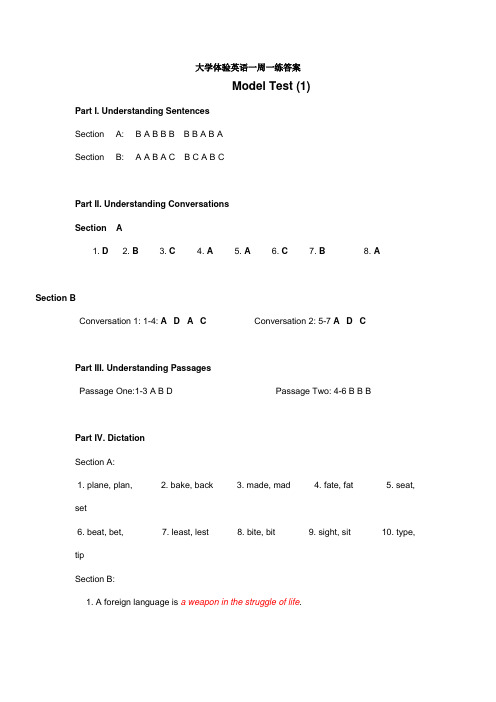
大学体验英语一周一练答案Model Test (1)Part I. Understanding SentencesSection A: B A B B B B B A B ASection B: A A B A C B C A B CPart II. Understanding ConversationsSection A1. D2. B3. C4. A5. A6. C7. B8. ASection BConversation 1: 1-4: A D A C Conversation 2: 5-7 A D CPart III. Understanding PassagesPassage One:1-3 A B D Passage Two: 4-6 B B BPart IV. DictationSection A:1. plane, plan,2. bake, back3. made, mad4. fate, fat5. seat,set6. beat, bet,7. least, lest8. bite, bit9. sight, sit 10. type,tipSection B:1. A foreign language is a weapon in the struggle of life.2. We must believe that each one of us is able to do something well, and that, when we discover what thissomething is, we must work until we succeed.3. There is no light during the night although there is a light on the right.4. She didn’t sit on the seat and here is the bill for the beer.5. A small leak will sink a great ship.6. There is no secret of success but hard work.7. Have an aim in life, or your energies will all be wasted.8. No sweet without sweat.9. A man of words and not of deeds is like a garden full of weeds.10. An hour in the morning is worth two in the evening.Part V. Vocabulary and Structure1. D2. A3. D4. A5. A6. C7. B8. B9. C 10. C11. C 12. C 13. B 14. D 15. C 16. D 17. D 18. A 19.B 20. BPart VI. Reading Comprehension (Reading in Depth)1. C2. I3. K4. L5. G6. O7. B8. E9.D 10. FPart VII. Error correction1. way∧fnd out → to2. tracking → track3. i n → across4. profts → benefts5. made → taken6. from →in7. added∧the air → to8. into → /9. soak∧the ground → into10. these → newModel Test (2)Key to Model Test (2) Band OnePart I. Understanding SentencesSection A: BBABB ABBBASection B: ABAAA CAABCPart II. Understanding ConversationsSection A: DADDA BBDSection B: A ABDACCPart III. Understanding PassagesPassage one:DAB Passage Two:ACCCPart IV. Spot Dictation1. celebrate2. national holiday3. set aside4. English settlers5. having survived6. 16217. having harvested8. share in9. relatives 10. specialPart V. Reading Comprehension1. B2. D3. A4. C5. D6. A7. C8. D9.B 10. CPart VI. Vocabulary and Structure1. C2. D3. C4. B5. D6. B7. B8. B9. D 10. D11. C 12. A 13. C 14. A 15. C 16. D 17. A 18. C 19.B 20. BPart VII. Translation1. regardless of the cost2. When the fire broke out3. the more progress you will make4. without hard work5. In other wordsModel Test (3)Part I. Understanding SentencesSection A: ABAAB ABBAASection B: ABABA CABABPart II. Understanding ConversationsSection A: DCACB BDBSection B: BCBABCAPart III. Understanding PassagesPassage one:CABPassage Two:ABACPart IV. Dictation1. experience2. frustrating3. published4. communicate5. participate6. insights7. Finally8. graduated9. standard 10. attentionPart V. Reading Comprehension (Skimming and Scanning)1. Y2. Y3. N4. N5.Y6.N 7. NG8. measurements 9. The thing you purposely change 10. the results are similar each timePart VI. Error correction1. seldom → never2. at → on3. by → in4. proverb∧says → which/that5. retained → regained6. others → others’7. on → of9. if →unless10. be attended∧→ toPart VII . Writing (略)Model Test (4)Part I. Understanding SentencesSection A: BBABB BABAB Section B: BACAC CACAAPart II. Understanding ConversationsSection A: DCABC DBC Section B: DCACADCPart III. Understanding PassagesPassage one: ABC Passage Two: CCCAPart IV. Dictation1. severely2. balance3. embarrassed4.growing 5. reluctance6. adjusted7. subjecting8. complaint9. fortunate 10. enviousPart V. Vocabulary and Structure1. A2. C3. B4. C5. A6. A7. C8. C9. A 10. C11. A 12. D 13. D 14. A 15. B 16. D 17. A 18. C 19.B 20. APart VI. Reading Comprehension1. C2. C3. B4. A5. B6. C7. B8. A9.C 10. DPart VII. Writing(略)Model Test (5)Part I. Understanding SentencesSection A: BABAB ABBAASection B: AACBA CBCABPart II. Understanding ConversationsSection A: D C C B A C A BSection B: C C D A D C DPart III. Understanding PassagesPassage one: CAA Passage Two: ABBDPart IV. Spot Dictation1. essential2. accomplish3. purposes4. convince5. proper6. occasion7. conveyed8. objective9. state 10. definitePart V. Reading Comprehension (Skimming and Scanning)1. Y2. N3. N4. Y5. N6. N7. Y8. Table tennis 9. ancient Greece 10. 1976。
Model Test Two

Model Test TwoPART I VOCABULARYSection ADirections: There are ten questions in this section. Each question is a sentence with one word or phrase underlined. Below the sentence are four words or phrases marked A. B. C andD. Choose the word or phrase that is closest in meaning to the underlined one.1. They used the skills acquired during the social science degree courses. Many of them hadscrutinized rule books and exploited every loophole in their favor.A. exploredB. fabricatedC. inspectedD. appraised2. The carrier is relieved of his liability if the loss or damage was caused by negligence on behalfof the sender when issuing instructions.A. ignoranceB. innocenceC. carelessnessD. indifference3. It is feasible for manufacturers to package their goods in recycled paper, yet at present only 27percent of the paper we consume is recycled.A. conceivableB. possibleC. imaginableD. advisable4. The commitment to economic recovery and growth has produced a dramatic rise in materialstandards of living and the world's second largest capitalist economy.A. dedicationB. qualificationC. precautionD. engagement5. Such explanations overlooked the history and depth of tension between the Hashemites andPalestinians, and ignored the continuing disparity of purpose between the two parties over the past half century.A. compromiseB. discrepancyC. irrelevanceD. uniformity6. This piece of writing may give them an opportunity to articulate some of their concerns.A. expressB. illustrateC. describeD. represent7. This airport is notorious for its bad security.A. appealingB. memorableC. conversingD. infamous8. The young man dreamed that a rich relative would die and leave him a legacy.A. heritageB. willC. houseD. lots of money9. There is abundant evidence that automobiles have a harmful effect on the environment.A. clearB. sufficientC. strongD. obvious10.The brain drain of experts away from developing countries will greatly influence thesecountries’ development of sophisticated industry.A. principalB. advancedC. primitiveD. collectiveSection BDirections: There are ten questions in this section. Each question is a sentence with something missing.Below each sentence are four words or phrases marked A, B, C and D. Choose one wordor phrase that best completes the sentence,11. Cultural ______indicates that human beings hand their languages from one generation toanother.A. translationB. transitionC. transmissionD. transaction12. The government will be better able to _________ other problems because it won’t be caughtup in planning ahead for future population growth.A. tackleB. challengeC. relieveD. eliminate13. After several nuclear disasters, a________ has raged over the safety of nuclear energy.几场核灾难过后,一场核能安全的争论到达了白热化。
Model Test 02
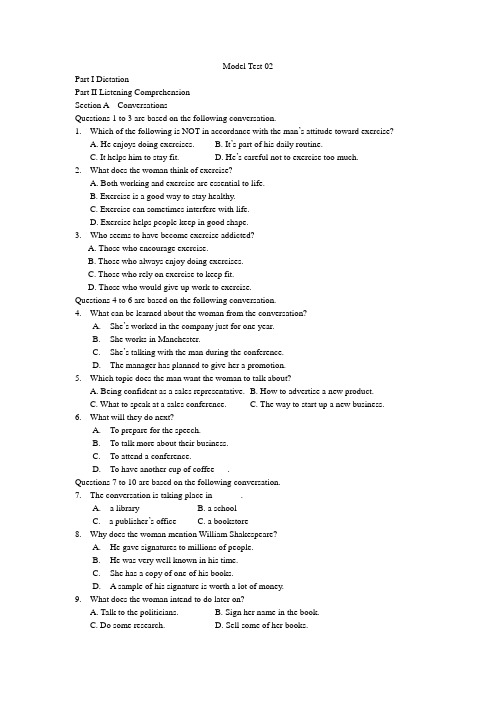
Model Test 02Part I DictationPart II Listening ComprehensionSection A ConversationsQuestions 1 to 3 are based on the following conversation.1.Which of the following is NOT in accordance with the man’s attitude toward exercise?A. He enjoys doing exercises.B. It’s part of his daily routine.C. It helps him to stay fit.D. He’s careful not to exercise too much.2.What does the woman think of exercise?A. Both working and exercise are essential to life.B. Exercise is a good way to stay healthy.C. Exercise can sometimes interfere with life.D. Exercise helps people keep in good shape.3. Who seems to have become exercise addicted?A. Those who encourage exercise.B. Those who always enjoy doing exercises.C. Those who rely on exercise to keep fit.D. Those who would give up work to exercise.Questions 4 to 6 are based on the following conversation.4.What can be learned about the woman from the conversation?A.She’s worked in the company just for one year.B.She works in Manchester.C.She’s talking with the man during the conference.D.The manager has planned to give her a promotion.5.Which topic does the man want the woman to talk about?A. Being confident as a sales representative.B. How to advertise a new product.C. What to speak at a sales conference. C. The way to start up a new business.6.What will they do next?A.To prepare for the speech.B.To talk more about their business.C.To attend a conference.D.To have another cup of coffee .Questions 7 to 10 are based on the following conversation.7.The conversation is taking place in ______.A. a libraryB. a schoolC. a publisher’s office C. a bookstore8.Why does the woman mention William Shakespeare?A.He gave signatures to millions of people.B.He was very well known in his time.C.She has a copy of one of his books.D. A sample of his signature is worth a lot of money.9.What does the woman intend to do later on?A. Talk to the politicians.B. Sign her name in the book.C. Do some research.D. Sell some of her books.10.What does the man think of the woman’s plan?A. She might be wasting her time.B. He can help her locate the name.C. She should wait and check the book out of the library.D. She had better get two poetry books instead.Section B PassagesQuestions 11 to 13 are based on the following passage.11.What do visitors to the game park learn about baboons?A. They can always friendly and playful.B. They can be dangerous if mishandled.C. No one can trust a baboon.D. Visitors should feed them and be kind to them.12.Which of the following is given to visitors as a warning when they enter the game park?A.Do not feed the animals.B. Keep away from angry animals.C. Keep their car windows closed.D. Do not picnic in the park.13.Who might be attacked in the game park?A.Those who tease the baboons.B. Those who get off their cars.C. Those who fail to keep the rules.D. Those who are near the angry animals. Questions 14 to 17 are based on the following passage.14.Mt. Rushmore is _____ feet high.A. 465B. 6200C. 60D.70015.Which face is NOT on Mt. Rushmore?A. President Lincoln’sB. President Jefferson’sC. President Roosevelt’sD. President Kennedy’s16.What was Gutzon Borglum’s profession?A. He was a sculptor.B. He was a painter.C. He was a mountain climber.D. He was a political leader.17.Who finished the work on the Shrine of Democracy?A. Gutzon Borglum.B. An Indian chief.C. Lincoln Borglum.D. It isn’t finished.Questions 18 to 20 are based on the following passage.18.The author seems to believe that asking your friend to lend you some money ____.A. will strengthen your friendship.B. will do harm to your friendship.C. is a good way to test your friendship.D. is a good way to break off your friendship.19.What does the professor of philosophy want to explain in his book?A. Money is an aim.B. Money is a means.C. Money is everything.D. Money is unimportant.20.Which of the following might the author disagree with?A.One should not lend money to a friend.B.The meaning of life does not completely lie in money.C.Happiness is not necessarily the result of wealth.D.Money is very important in modern society.Section C News BroadcastQuestions 21 to 22 are based on the following news.21.Where was/were struck by the earthquakes?A. Kuril Islands.B. Marcus, Wake and Midway Islands.C. Eastern Japan.D. Northern Japan.22.What warning has been given to local residents?A.To flee from Pacific coastal areas.B.To flee to Pacific coastal areas.C. To move to higher ground.D.To move to the Kuril Islands. Questions 23 to 24 are based on the following news.23.What made it difficult to tackle the issue?A. Lack of sanctions against the use of forced labor.B. Lack of consolidated legislation on forced labor.C. Ineffective prosecutions into the use of forced labor.D. Involvement of politicians and judges in the use of forced labor.24.Which of the following is NOT true?A.Slave laboring is a serious social problem in Brazil.B.The Brazilian government is praised for its efforts to tackle the problem.C.Slave laboring is only found in the Amazon.D.Slave laborers work in poor conditions.Questions 25 to 26 are based on the following news.25.Who is/are to be blamed for the death of the customers?A. The rescue workers.B. The security guards at the store.C. The panic crowd in the store.D. The Interior Minister.26.What hindered the escape of the crowd trapped in the fire?A.Panic in the crowd.B.Poor management in the store.C.Locked doors at the exits.D.Delayed rescue efforts.Questions 27 to 28 are based on the following news.27.What CANNOT be inferred about the strike?A.The strike spreads across the country.B.The majority of doctors in the capital took part in the strike.C.Patients had been left without care at most hospitals.D.No operations could be done during the strike.28.The protestors are against _____.A.increasing admission of poor students to state-funded collegesB.increasing job opportunities of poor medical studentsC.increasing wages of poor medical workersD.increasing funds to poorly-operated hospitals.Questions 29 to 30 are based on the following news.29.What does Europe demand as far as Iran is concerned?A. Iran should completely freeze its sensitive nuclear programs.B. IAEA should suspend temporarily its investigation into Iranian nuclear program.C. Iran should be referred to the UN Security Council.D. Iran should stop its confrontation with the U.S. and Europe30.What did the U.S. demand?A. Full cooperation between Iran and the IAEAB. Further investigation into Iran’s nuclear program.C. Possible UN sanctions on Iraq.D. Complete dismantlement of Iran’s nuclear equipment.。
Model Test 1-6参考答案
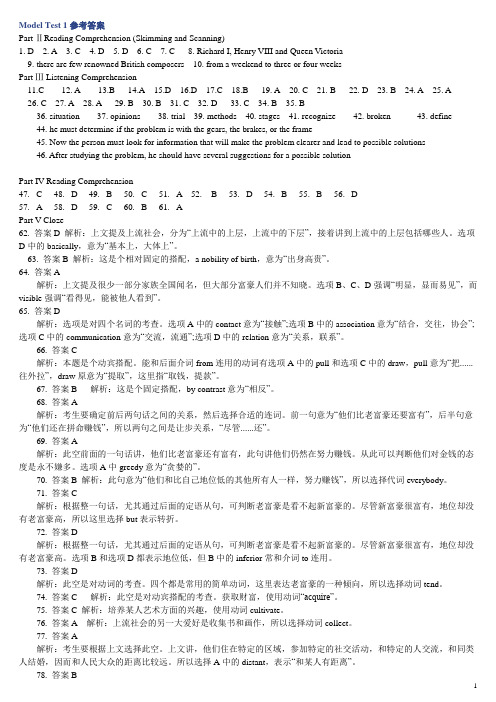
Model Test 1参考答案Part ⅡReading Comprehension (Skimming and Scanning)1. D2. A3. C4. D5. D6. C7. C8. Richard I, Henry VIII and Queen Victoria9. there are few renowned British composers10. from a weekend to three or four weeksPart Ⅲ Listening Comprehension11.C12. A13.B 14.A15.D16.D17.C 18.B 19. A20. C21. B 22. D23. B24. A25. A26. C27. A28. A 29. B30. B31. C32. D 33. C34. B35. B36. situation37. opinions38. trial 39. methods 40. stages41. recognize42. broken43. define44. he must determine if the problem is with the gears, the brakes, or the frame45. Now the person must look for information that will make the problem clearer and lead to possible solutions46. After studying the problem, he should have several suggestions for a possible solutionPart IV Reading Comprehension47. C 48. D 49. B 50. C 51. A 52. B 53. D 54. B 55. B 56. D57. A 58. D 59. C 60. B 61. APart V Cloze62. 答案D 解析:上文提及上流社会,分为“上流中的上层,上流中的下层”,接着讲到上流中的上层包括哪些人。
Model Test Two答案解析
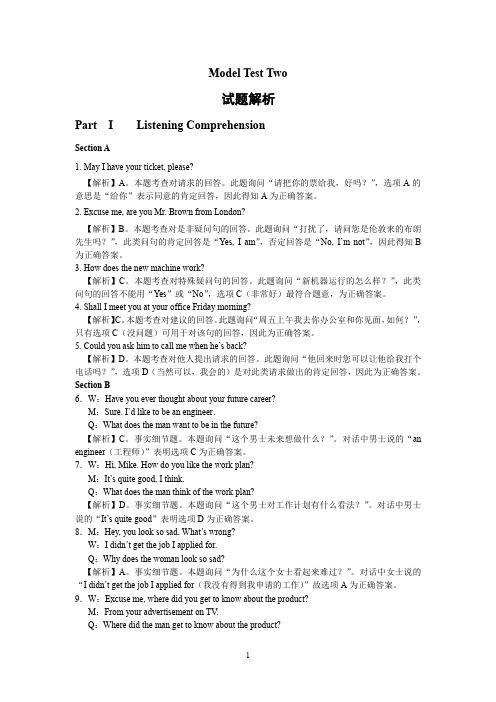
Model Test Two试题解析Part I Listening ComprehensionSection A1. May I have your ticket, please?【解析】A。
本题考查对请求的回答。
此题询问“请把你的票给我,好吗?”,选项A的意思是“给你”表示同意的肯定回答,因此得知A为正确答案。
2. Excuse me, are you Mr. Brown from London?【解析】B。
本题考查对是非疑问句的回答。
此题询问“打扰了,请问您是伦敦来的布朗先生吗?”,此类问句的肯定回答是“Yes, I am”,否定回答是“No, I’m not”,因此得知B 为正确答案。
3. How does the new machine work?【解析】C。
本题考查对特殊疑问句的回答。
此题询问“新机器运行的怎么样?”,此类问句的回答不能用“Yes”或“No”,选项C(非常好)最符合题意,为正确答案。
4. Shall I meet you at your office Friday morning?【解析】C。
本题考查对建议的回答。
此题询问“周五上午我去你办公室和你见面,如何?”,只有选项C(没问题)可用于对该句的回答,因此为正确答案。
5. Could you ask him to call me when he’s back?【解析】D。
本题考查对他人提出请求的回答。
此题询问“他回来时您可以让他给我打个电话吗?”,选项D(当然可以,我会的)是对此类请求做出的肯定回答,因此为正确答案。
Section B6.W:Have you ever thought about your future career?M:Sure. I’d like to be an engineer.Q:What does the man want to be in the future?【解析】C。
事实细节题。
本题询问“这个男士未来想做什么?”。
- 1、下载文档前请自行甄别文档内容的完整性,平台不提供额外的编辑、内容补充、找答案等附加服务。
- 2、"仅部分预览"的文档,不可在线预览部分如存在完整性等问题,可反馈申请退款(可完整预览的文档不适用该条件!)。
- 3、如文档侵犯您的权益,请联系客服反馈,我们会尽快为您处理(人工客服工作时间:9:00-18:30)。
Model Test 2参考答案
Part ⅡReading Comprehension (Skimming and Scanning)
1. 答案B
解析:根据题干,考生可锁定文章的第三段。
段首讲,关于解梦,没有人比Sigmund Freud 给出的答案让人更满意。
2. 答案C
解析:根据选项的内容,考生可锁定文章的第四段。
第四段一开始就讲到Sigmund Freud 的生平。
选项B是个干扰性,文中只说到end his days(终老),并没有说end his life(自杀)。
3. 答案A
解析:根据题干,考生可关注文章的第六段。
第六段中讲:他了解人身体如何运行,却越来越关注人类心理。
从中可以判断,他对人类心理更感兴趣。
4. 答案D
解析:根据题干,考生可锁定文章的第八段。
段首讲,那个年代,基本上没有医生对这个话题感兴趣。
考生可回到第七段,确定“这个话题”指代的是“想法、意见和梦境”。
5. 答案A
解析:根据题干中的人名Dr Josef Breuer ,考生可锁定文章的第九段。
Josef Breuer 医生给Freud讲了自己一个病人的故事,这给Freud带来了灵感。
由此可以判断,在Freud 学说中,Josef Breuer医生提供了一些帮助。
6. 答案D
解析:根据题干,考生可锁定文章的第十段。
此段主要讲了什么是心理分析,也就是所谓的“谈心疗法”,即病人可以自由地讨论自己遇到的困扰。
7. 答案C
解析:根据题干,考生可锁定文章的第十一段。
段中的原话为,He discovered that the feelings of very young children are not so different from those of their parents,而选项C是其同义句。
8. 答案the human mind
解析:根据题干,考生可锁定文章的第十二段。
很多人肯定,Freud找到了打开人类心理的一把钥匙。
9. 答案literature and science
解析:根据题干,考生可锁定文章的第十二段。
Freud在很多方面都带来了深刻的影响,如现代艺术,文学和科学等。
10. 答案crazy
解析:根据题干,考生可锁定文章的第十二段。
此段的最后一句话讲到,那些人曾被叫做“crazy”。
Part III Listening Comprehension
11.C 12.B 13.C 14.D 15. B 16.C 17.A 18.D 19. B 20. A
21. C 22. C 23. B 24. C 25. C 26. B 27. C 28. D 29. D 30. B
31. C 32. C 33. A 34. D 35. C
36. fashionable
37. complained
38. obedience
40. critics
41. opportunity
42. traditional
43. approve
44. people whom their parents have never met, and choose occupations different from those of their parents
45. the ambitions that parents have for their children are another cause of the division between them
46. elderly people are valued for their wisdom, but in our society the knowledge of a lifetime may become obsolete overnight
Part ⅣReading Comprehension (Reading in Depth) (25 minutes)
47. C 48. C 49. A 50. B 51. D
52. D 53. D 54. A 55. C 56. A
57. B 58. C 59. C 60. B 61. D
Part V Cloze (15 minutes)
62.答案B
解析:此处stay做系动词,后面加一个名词,表示“保持某种状态”。
63.答案D
解析:常和介词against连用的名词为选项A中的safeguard和选项D中defense。
safeguard 意为“保卫者,保护措施”,defense意为“防卫”。
64.答案C
解析:此空考查动词和介词的搭配。
和介词to连用的动词是expose,意为“使……置身于”。
而其他三个动词和介词from连用。
65.答案A
解析:此空考查副词。
选项A中的generally意为“一般来讲”;选项B中commonly意为“通常地,普通地”;选项C中的frequently意为“经常”;选项D中的genetically意为“遗传方面地”。
66.答案B
解析:此空考查固定搭配,生病的英语表达为“fall ill”。
67.答案A
解析:考生要注意,evidence后面的从句是个同位语从句,解释说明evidence的内容,所以用连词that来引导同位语从句。
68.答案C
解析:此空考查动词搭配。
四个选项中只有ward可以和off连用,ward off意为“防止,避开”。
69.答案B
解析:考生要注意上下文的联系。
上文讲,“积极向上的情感类型”可以帮助抵抗感冒和其他疾病。
所以说,快乐感是可以提高免疫功能的。
因此,选项B为正确答案。
70.答案B
解析:后面作者列举了两种情况,a scratchy throat,a runny nose,快乐的人不太会受到这两种情况的困扰。
而选项A是个干扰项,suffer一般不用于被动态。
解析:此句意为:拥有积极向上情感类型的人们对病毒有不同的免疫反应。
选项D是个干扰性,reaction强调“反作用力,化学反应”。
72.答案C
解析:能和后面的as连用的动词有选项A、C、D。
选项A中需要用think of ... as;选项D中translate ... as意为“把……翻译为”。
而选项C中的interpret意为“解释说明”,符合题意。
73.答案C
解析:根据后面从句使用的过去时态,可以判断这是个过去的研究。
选项C中的previous 意为“上一个”。
选项B是个干扰项,former指两者中的前者。
74.答案B
解析:考生要注意两句之间的关系。
前一句讲,这个研究发现快乐的人不容易得感冒,后一句讲,仍存在某些疑问。
可以判断,两句之间是对比的关系,选择连词but。
75.答案B
解析:此处是个宾语从句用作介词to的宾语,这里强调情感特点是否起作用,选择连词whether。
76.答案A
解析:此空考查动词短语。
选项A中的tend to意为“倾向于,易于”;选项B中的incline to 强调“赞同,支持”的含义;选项C中的apt to意为“有可能”,强调某事发生的可能性;选项D中的subject to意为“屈服于,让步于,易受…….的影响”。
因此只有A符合题意。
77.答案D
解析:judge ... as意为“判断……为”,此处使用被动语态。
78.答案A
解析:此题要结合上下两句话的含义。
前一句讲到积极向上的人,后一句讲到消极的人,所以两者之间是对比关系,选择连词while。
79.答案C
解析:后面的两种物质包含在前面的滴鼻剂中。
选项A和B强调某个整体是由哪些部分组成;选项D中的cover强调整体的覆盖。
80.答案C
解析:此空比较简单,文章的第三段中曾经出现过,这里指的是实验对象。
81.答案A
解析:考生要注意,while连接前后两个句子,前面的句子强调志愿者的主观感受,如疼痛等;后面的句子强调研究人员收集的实验数据,具有客观性。
Part VI Translation
82. and never yielded to any difficulties as well
83. that I have no way to concentrate on my study
84. unless it’s cornered
85. at a speed of 12 million per year
86. you can't praise him enough。
